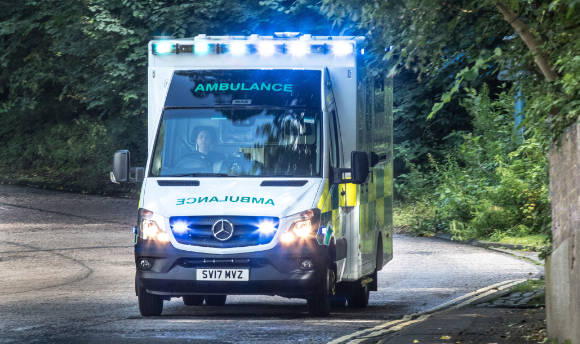VR gives paramedics a reality check
Keeping it real – VR gives paramedics a reality check.
Long gone are the days when a paramedic was referred to as an ‘ambulance driver’.
The varied and demanding role of a front line paramedic extends way beyond patient transport or administering care in the back of an ambulance. In more recent years, the needs of the population have changed, which has had a direct impact on the role of the paramedic.
As our older population increases, so do the number of people who live with multiple long term conditions. The paramedic has had to evolve to accommodate the demands of operating in increasing diverse situations and working environments. Nowadays, it is not uncommon for paramedics to be attached to a GP practice or to be working in community teams who aim to treat people locally and enable them to keep living in their homes. They can also be found working in response teams, dealing with major incidents; or in management roles in senior leadership positions. In 2020, QMU commenced the first year of its new BSc Paramedic Science course to develop a new generation of paramedics.
To support the expansion of the role beyond acute trauma, new styles of teaching are being introduced. This is helping learners understand the wider paramedic role which now involves the management of long term conditions; mental health care; support of older people; and work which will reduce hospital admissions.
As if our paramedic students weren’t already living life in the fast lane, learning got a whole lot more exciting when QMU enlisted the expertise of Viarama – Scotland’s first virtual reality social enterprise.
Together, Viarama, and QMU’s impressive paramedic teaching team, are creating a learning experience for students which is second to none.
Sona Mojzisova, Lecturer on the BSc Paramedic Science, has worked as a paramedic for eight years.
She explained:
One of the great things about virtual reality (VR) is that it can allow people to have experiences that otherwise would be impossible. For paramedics, this means we can place students in situations that would be dangerous in real life, and we can do that safely in a controlled manner. Sometimes that situation maybe a day-to-day occurrence like dealing with someone in labour, or we can crank up the pressure by allowing them to experience a major incident or multiple casualty trauma
Sona continued:
“Working on the front line, paramedics are exposed to stressful and sometimes extreme situations that require quick decision making and decisive action. Often, people don’t feel they are prepared for these situations but virtual reality is proving to be a game changer. It can be immensely useful in helping students get a feel for the situations that they will be working in. It allows them to feel as if they are part of a live event by learning from an expert who is dealing with the situation. They can use their observation skills; make assessments about what is going on; see decision making in action; and identify risk. It provides an immersive experience which will prepare them well for delivering the person-centred care required from a modern day paramedic.”
Billy Agnew, Founder of Viarama, said:
Particularly in the current climate when everyone is working hard to keep students safe, VR is proving invaluable. We can gently expose students to situations that would be extremely challenging in a real-world setting. VR is allowing our students to experience complex episodes of care, but the crucial difference is that we can control what is shown, and how graphic a depiction that is. This allows learners to experience situations that would otherwise be very difficult to recreate in real life, which is vital in building confidence in their growing abilities.
“As the students advance in their learning, VR can be used to expose them to more complex and challenging situations. When the time is right, we can create a real hard core front line experience. It’s quite an exhilarating way to learn.” Viarama is excited to be leading the VR experience at QMU. Billy said: “This forward-thinking and highly innovative approach taken by the University is setting the way for the future training and education of Scotland’s new generation of paramedics.”
Find out more about the BSc Paramedic Science at QMU




